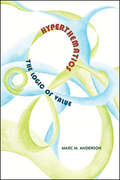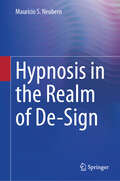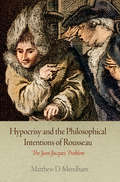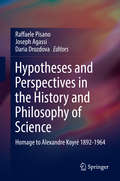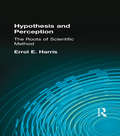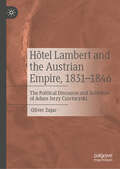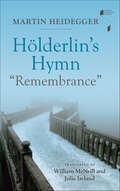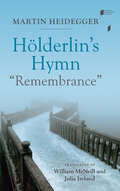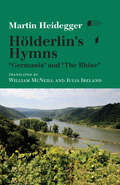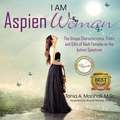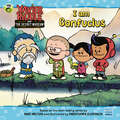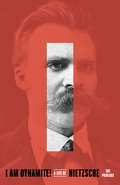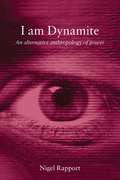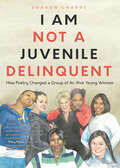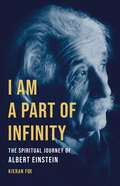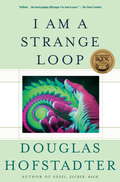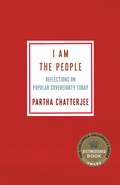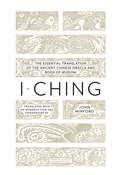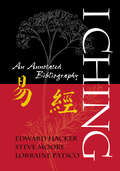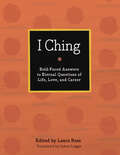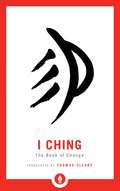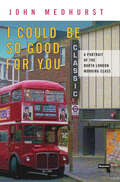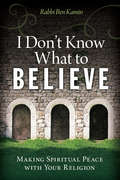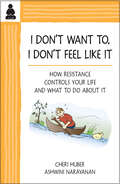- Table View
- List View
Hyperthematics: The Logic of Value (SUNY series in American Philosophy and Cultural Thought)
by Marc M. AndersonIn this innovative work, Marc M. Anderson presents an account of value and value creation, which both defines value and introduces a method to manipulate value practically. Using this new methodology, Anderson first explores where value lies in experience, both human and otherwise, uncovering tendencies in human action and the natural world that create and destroy value. From that analysis, he generates practical principles to be applied in creating value in any region or discipline of human experience, at any scale, including corporate organization and product design, economics, the sciences, the arts, urban and architectural design, and sustainable development. He tests this methodology by focusing on the organization and production of commercial corporations in particular, suggesting ways to rethink and transform organization, product creation, and the contemporary currency system. He considers the implications for the many intersections of corporate production with human life, from urban planning, medicine, and food production to pornography, weaponry, and environmental engagement, with corresponding suggestions for transformation toward value. Throughout, Hyperthematics examines complexity, the nature of objects, the inevitable future intermingling of science and ethics, and assumptions driving the contemporary culture wars.
Hypnosis in the Realm of De-Sign
by Maurício S. NeubernThis book presents a new theoretical framework for the study of hypnosis based on an innovative epistemological approach called De-sign. This approach transcends the opposition subjectivity-objectivity and presents itself as a metaknowledge that integrates design and semiotics and proposes a phenomenological method of inquiry that helps overcome some of the traditional challenges to create theoretical models to explain hypnosis. Both hypnosis and De-sign are critical practices against absolute notions of reality, especially regarding time, space, and otherness. Both of them consider the importance of epistemological notions such as imagination, feelings, and desire, that modern science commonly marginalizes. Hypnosis and De-sign implicate people in partnership, being critical to a dominant notion of control. Thus, the book presents in-depth discussions on major themes of hypnosis, bringing clinical practice closer to the reflections brought by De-sign. Hypnosis in the Realm of De-Sign shows how to integrate semiotic systems, pragmatism, and De-sign principles to analyze actual hypnotherapeutic experiences. As with every De-sign situation, each patient requires a unique therapeutic strategy and approach that is individually appropriate for them. The author thereby encourages therapists to become de-signers, working with — not for — their subjects to create a context within which their subjects can awaken their therapeutic potential. By doing so, patients can then bring into focus that which could be, rather than focusing on that which is.
Hypocrisy and the Philosophical Intentions of Rousseau: The Jean-Jacques Problem
by Matthew D. MendhamWhy did Rousseau fail—often so ridiculously or grotesquely—to live up to his own principles? In one of the most notorious cases of hypocrisy in intellectual history, this champion of the joys of domestic life immediately rid himself of each of his five children, placing them in an orphans' home. He advocated profound devotion to republican civic life, and yet he habitually dodged opportunities for political engagement. Finally, despite an elevated ethics of social duty, he had a pattern of turning against his most intimate friends, and ultimately fled humanity and civilization as such.In Hypocrisy and the Philosophical Intentions of Rousseau, Matthew D. Mendham is the first to systematically analyze Rousseau's normative philosophy and self-portrayals in view of the yawning gap between them. He challenges recent approaches to "the Jean-Jacques problem," which tend either to dismiss his life or to downgrade his principles. Engaging in a comprehensive and penetrating analysis of Rousseau's works, including commonly neglected texts like his untranslated letters, Mendham reveals a figure who urgently sought to reconcile his life to his most elevated principles throughout the period of his main normative writings. But after the revelation of the secret about his children, and his disastrous stay in England, Rousseau began to shrink from the ambitious philosophical life to which he had previously aspired, newly driven to mitigate culpability for his discarded children, to a new quietism regarding civic engagement, and to a collapse of his sense of social duty. This book provides a moral biography in view of Rousseau's most controversial behaviors, as well as a preamble to future discussions of the spirit of his thought, positing a development more fundamental than the recent paradigms have allowed for.
Hypotheses and Perspectives in the History and Philosophy of Science
by Joseph Agassi Raffaele Pisano Daria DrozdovaTo commemorate the 50th anniversary of his passing (in 2014), this special book features studies on Alexandre Koyr#65533; (1892-1964), one of the most influential historians of science of the 20th century, who re-evaluated prevalent thinking on the history and philosophy of science. In particular, it explores Koyr#65533;'s intellectual matrix and heritage within interdisciplinary fields of historical, epistemological and philosophical scientific thought. Koyr#65533; is rightly noted as both a versatile historian on the birth and development of modern science and for his interest in philosophical questions on the nature of scientific knowledge. In the 1940s and 1950s his activities in the United States established a crucial bridge between the European historical tradition of science studies and the American academic environments, and an entire generation of historians of science grew up under his direct influence. The book brings together contributions from leading experts in the field, and offers much-needed insights into the subject from historical, nature of science, and philosophical perspectives. It provides an absorbing and revealing read for historians, philosophers and scientists alike.
Hypothesis and Perception: The Roots of Scientific Method (Humanities Paperback Library)
by Errol E. HarrisThis is Volume X of seventeen in a collection of works on the Philosophy of Mind and Psychology in the Library of Philosophy which was designed as a contribution to the History of Modern Philosophy under the heads: first of Different Schools of Thought-Sensationalist, Realist, Idealist, Intuitivist; secondly of different Subjects-Psychology, Ethics, Political Philosophy, Theology. Originally published in 1970, this volume brings together essays on Hypothesis and Perception.
Hôtel Lambert and the Austrian Empire, 1831–1846: The Political Discourse and Activities of Adam Jerzy Czartoryski
by Oliver ZajacThis book analyses the political discourse and activities of the constitutionalist-monarchist wing of the Polish Great Emigration, which saw the emigration of several thousand people from the territory of the former Polish-Lithuanian Commonwealth from 1831 to 1864, after the failure of the November Uprising of 1830–1831. The book examines the political faction of émigrés led by Prince Adam Jerzy Czartoryski, which came to be known as ‘Hôtel Lambert’. By analysing the theoretical discourse in the milieu of the Czartoryski faction and, at the same time, by analysing the plans and efforts to put their theoretical stands into practical policy, the book seeks to answer the question of how the leading representatives of the constitutionalist-monarchist wing of the Great Emigration perceived the Austrian Empire and how their ideas about the past, the present, and the assumption of the future of not only the Polish state but also of the whole of Europe, were projected into their ideas and plans concerning the Austrian Empire. Therefore, the author offers not only conclusions concerning the Austrian Empire from the specific Polish point of view but also interesting perspectives about the projected future of the European continent. Thus, its broad scope provides insights for those researching nineteenth-century European politics, diplomacy, and political thought, particularly regarding phenomena such as nationalism, federalism, democracy, constitutionalism, and perpetual peace theory, among others.
Hölderlin's Hymn "Remembrance" (Studies in Continental Thought)
by Martin HeideggerMartin Heidegger's 1941–1942 lecture course on Friedrich Hölderlin's hymn, "Remembrance," delivered immediately following his confrontation with Nietzsche, lays out a detailed plan for the interpretation of Hölderlin's poetry in which remembrance is a central concern. With its emphasis on the "free use of the national" and the "holy of the fatherland," the course marks an important progression in Heidegger's political thought. In addition to its startlingly innovative analyses of greeting, the festive, and the dream, the text provides Heidegger's fullest elaboration of the structure of commemorative thinking in relationship to time and the possibility of an "other beginning." This English translation by William McNeill and Julia Ireland completes the series of Heidegger's major lecture courses on Hölderlin.
Hölderlin's Hymn "Remembrance" (Studies in Continental Thought)
by Martin Heidegger“This faithful and readable translation . . . serves as a critical orientation to interpreting Heidegger’s later thought” inspired by Hölderlin’s poetry (Christopher D. Merwin, Emory University).Over the course of 1941–42, Martin Heidegger delivered a lecture course on Friedrich Hölderlin’s hymn, “Remembrance.” Immediately following his confrontation with Nietzsche, it lays out a detailed plan for the interpretation of Hölderlin’s poetry in which remembrance is a central concern. With its emphasis on the “free use of the national” and the “holy of the fatherland,” the course marks an important progression in Heidegger’s political thought.In addition to its startlingly innovative analyses of greeting, the festive, and the dream, the text provides Heidegger’s fullest elaboration of the structure of commemorative thinking in relationship to time and the possibility of an “other beginning.” This English translation by William McNeill and Julia Ireland completes the series of Heidegger’s major lecture courses on Hölderlin.
Hölderlin's Hymns: "Germania" and "The Rhine" (Studies in Continental Thought)
by Martin Heidegger“Translated with skill and precision, these lectures . . . present the most penetrating analysis of two of Hölderlin’s most significant hymns” (Choice).Martin Heidegger’s 1934–1935 lectures on Friedrich Hölderlin’s hymns “Germania” and “The Rhine” are considered the most significant among Heidegger’s lectures on Hölderlin. Coming at a crucial time in his career, the text illustrates Heidegger’s turn toward language, art, and poetry while reflecting his despair at his failure to revolutionize the German university and his hope for a more profound revolution through the German language, guided by Hölderlin’s poetry.These lectures are important for understanding Heidegger’s changing relation to politics, his turn toward Nietzsche, his thinking about the German language, and his breakthrough to a new kind of poetic thinking.“[This translation], including a clear and concise introduction and useful glossaries, attains both accuracy and clarity, rarely faltering in its choice of words.” —Notre Dame Philosophical Reviews
I Am AspienWoman: The Unique Characteristics, Traits, and Gifts of Adult Females on the Autism Spectrum
by Tania Marshall<p>This book explores the female profile (phenotype), including sub-types, in late teenagers to the elderly, who are on the Autism Spectrum. Written by 2017-2015 ASPECT Autism Australia National Recognition Award Nominee (Advancement Category), for advancing the field of female Autism, Tania A. Marshall's first book in a series entitled, I Am AspienGirl© showcases the unique characteristics, traits and gifts of adult females, across the lifespan, on the Autism Spectrum. Award. Presently, there is a female Autism crisis including: a gender bias, a lack of research, assessment tools, intervention and skills acquisition tools, specifically researched and designed for females across the lifespan. This book explores the female profile (phenotype), including sub-types. <p>When "I Am AspienWoman©" was released, it became an instant bestseller and ignited a discussion about the lost generation of Autistic females, gender differences, misdiagnosis, mismedication, and the lack of assessment tools, resources and interventions. This is a part the current female Autism crisis. I Am AspienWoman showcases the unique characteristics, traits and gifts of adult females on the Autism Spectrum. I Am AspienWoman is the sequel to the 2015 eLIT Gold Medal Award winning, I Am AspienGirl. <p>Have you ever wondered about a friend, a partner, a mother, sister or daughter? Wondered why she says she feels 'different'? Out of step with her peers, she may struggle keeping friends and a job, yet she has multiple degrees. Bright from early on, she may have singleminded focus, sprinkles of anxiety, sensory and social issues, be gifted in art, writing, science, research or singing. Maybe Autism or Asperger Syndrome was mentioned but she did not resonate with the male profile or the stereotypical female profile. Maybe she is a woman on the Autism spectrum, with a unique constellation of super-abilities, strengths and challenges? <p>This book takes a unique approach by combining stunning imagery along with the feelings, thoughts and words of Autistic women (and those that love and support them). This book also explores common strengths and challenges, the stages leading up to a diagnosis, important needs, reasons for a diagnosis, disclosure and an appendix of helpful tools. You will be inspired by a special group of 24 Autistic women led by Dr Temple Grandin, who showcase their unique strengths and provide helpful advice and tips. Watch for AspienPowers: Celebrating the Unique constellation of Gifts, Strengths and Abilities of Females on the Autism Spectrum, coming soon.</p>
I Am Confucius (Xavier Riddle and the Secret Museum)
by Gabriella DeGennaroAn 8x8 book based on an episode from the PBS KIDS animated television series Xavier Riddle and the Secret Museum starring Confucius.Based on the children's book series Ordinary People Change the World by New York Times bestselling author Brad Meltzer and illustrator Christopher Eliopoulos, the series will introduce kids to inspiring historical figures and the character virtues that helped them succeed.When Xavier and Yadina can't stop fighting, Brad decides it's time for the trio to head to the Secret Museum! They're sent to China in the year 543 BCE to meet Confucius. He teaches them "The Golden Rule": Treat others how you would like to be treated. This episode-based 8x8 will focus on the traits that made our heroes great--the traits that kids can aspire to in order to live heroically themselves.
I Am Dynamite!: A Life of Nietzsche
by Sue PrideauxA groundbreaking new biography of philosophy’s greatest iconoclast Friedrich Nietzsche is one of the most enigmatic figures in philosophy, and his concepts—the Übermensch, the will to power, slave morality—have fundamentally reshaped our understanding of the human condition. But what do most people really know of Nietzsche—beyond the mustache, the scowl, and the lingering association with nihilism and fascism? Where do we place a thinker who was equally beloved by Albert Camus, Ayn Rand, Martin Buber, and Adolf Hitler? Nietzsche wrote that all philosophy is autobiographical, and in this vividly compelling, myth-shattering biography, Sue Prideaux brings readers into the world of this brilliant, eccentric, and deeply troubled man, illuminating the events and people that shaped his life and work. From his placid, devoutly Christian upbringing—overshadowed by the mysterious death of his father—through his teaching career, lonely philosophizing on high mountains, and heart-breaking descent into madness, Prideaux documents Nietzsche’s intellectual and emotional life with a novelist’s insight and sensitivity. She also produces unforgettable portraits of the people who were most important to him, including Richard and Cosima Wagner, Lou Salomé, the femme fatale who broke his heart; and his sister Elizabeth, a rabid German nationalist and anti-Semite who manipulated his texts and turned the Nietzsche archive into a destination for Nazi ideologues. I Am Dynamite! is the essential biography for anyone seeking to understand history's most misunderstood philosopher.
I Am Dynamite: An Alternative Anthropology of Power
by Nigel RapportPower is conventionally regarded as being held by social institutions. We are taught to believe that it is these social structures that determine the environment and circumstances of individual lives. In I Am Dynamite, the anthropologist Nigel Rappaport argues for a different view. Focusing on the lives and works of the writer and Auschwitz survivor Primo Levi, refugee and engineer Ben Glaser, Israeli ceramicist and immigrant Rachel Siblerstein, artist Stanley Spencer, and philosopher Friedrich Nietzsche, he shows how we can have the capacity and inclination to formulate 'life projects'. It is in the pursuit of these life projects, that is, making our life our work, that we can avoid the structures of ideology and institution.
I Am Not a Juvenile Delinquent: How Poetry Changed a Group of At-Risk Young Women
by Sharon ChardeThe #metoo movement, particularly the horrific Larry Nasser abuse, shows with frightening clarity the vulnerability of young women to male predators; all the Touchtone girls I encountered suffered similar or worse fates. The book is a pilgrimage, a quest story, divided into five sections. Part I explores the authors first year at the facility, the difficulty and eventual success of establishing my group in such a chaotic and contradictory culture. It recreates their writing sessions, and features the vivid, dramatic personalities of the girls who participated as well as the steep learning curve on which she found herself daily. Part II moves swiftly through the trials and victories between the first and last years, and offers brief profiles of three of the residents who held special resonance to the author. During this time she published an award-winning anthology of poems by the girls, a NYC filmmaker created a documentary film, many readings and public performances took place and received several awards for the program. Part III tells of the joint venture with The Hotchkiss School, revealing the differences yet common ground between the two groups of girls.
I Am a Part of Infinity: The Spiritual Journey of Albert Einstein
by Kieran FoxA "beautifully written" (David Fideler) spiritual biography of Albert Einstein that reveals for the first time the scientific and religious origins of his personal philosophy — "a must-read for anyone who wants to understand the mind of the great physicist" (Jo Marchant) Albert Einstein remains renowned around the world for revolutionizing our understanding of the cosmos, but very few realize that the celebrated scientist had a deep spiritual side. Einstein believed that one wondrous force was woven through all things everywhere—and this sense of the pervasive sacred influenced every aspect of his existence, from his marvelous science to his passionate pacifism. I Am a Part of Infinity offers the first in-depth exploration of Einstein&’s spirituality, showing how he drew on a dazzling diversity of thinkers—from Pythagoras to Plato, Schopenhauer to Spinoza, the Upanishads to Mahatma Gandhi—to create a novel system where mysticism met mathematics, reality was revered, and the human mind was honored as a mirror of the infinite. This wasn&’t just a new way of seeing the world. Einstein asked us to commune with the cosmos, to treat every living creature with compassion, to channel the power that permeated all things and put it to use for pure purposes. Drawing on little-known conversations, recently published letters, and new archival research, I Am a Part of Infinity reveals what Einstein really believed and why his perspective still matters today.
I Am a Strange Loop
by Douglas R. HofstadterCan thought arise out of matter? Can self, soul, consciousness, "I” arise out of mere matter? If it cannot, then how can you or I be here? I Am a Strange Loop argues that the key to understanding selves and consciousness is the "strange loop”--a special kind of abstract feedback loop inhabiting our brains. The most central and complex symbol in your brain is the one called "I. ” The "I” is the nexus in our brain, one of many symbols seeming to have free will and to have gained the paradoxical ability to push particles around, rather than the reverse. How can a mysterious abstraction be real--or is our "I” merely a convenient fiction? Does an "I” exert genuine power over the particles in our brain, or is it helplessly pushed around by the laws of physics? These are the mysteries tackled in I Am a Strange Loop, Douglas Hofstadter’s first book-length journey into philosophy since Gödel, Escher, Bach. Compulsively readable and endlessly thought-provoking, this is a moving and profound inquiry into the nature of mind.
I Am the People: Reflections on Popular Sovereignty Today (Ruth Benedict Book Series)
by Partha ChatterjeeThe forms of liberal government that emerged after World War II are in the midst of a profound crisis. In I Am the People, Partha Chatterjee reconsiders the concept of popular sovereignty in order to explain today’s dramatic outburst of movements claiming to speak for “the people.”To uncover the roots of populism, Chatterjee traces the twentieth-century trajectory of the welfare state and neoliberal reforms. Mobilizing ideals of popular sovereignty and the emotional appeal of nationalism, anticolonial movements ushered in a world of nation-states while liberal democracies in Europe guaranteed social rights to their citizens. But as neoliberal techniques shrank the scope of government, politics gave way to technical administration by experts. Once the state could no longer claim an emotional bond with the people, the ruling bloc lost the consent of the governed. To fill the void, a proliferation of populist leaders have mobilized disaffected groups into a battle that they define as the authentic people against entrenched oligarchy.Once politics enters a spiral of competitive populism, Chatterjee cautions, there is no easy return to pristine liberalism. Only a counter-hegemonic social force that challenges global capital and facilitates the equal participation of all peoples in democratic governance can achieve significant transformation. Drawing on thinkers such as Antonio Gramsci, Michel Foucault, and Ernesto Laclau and with a particular focus on the history of populism in India, I Am the People is a sweeping, theoretically rich account of the origins of today’s tempests.
I Ching
by John MinfordA landmark new translation of the ancient Chinese oracle and book of wisdom Pose a question, then toss three coins (or cast your yarrow stalks) to access the time-honored wisdom of the I Ching. The I Ching, or Book of Change, has been consulted through the ages, in both China and the West, for answers to fundamental questions about the world and our place in it. The oldest extant book of divination, it dates back three thousand years to ancient shamanistic practices involving the ritual preparation of the shoulder bones of oxen. From this early form of communication with the other world, it has become the Chinese spiritual book par excellence. An influence on such cultural icons as Bob Dylan, John Cage, Merce Cunningham, Philip K. Dick, and Philip Pullman, the I Ching is turned to by millions around the world for insights on spiritual growth, business, medicine, genetics, game theory, strategic thinking, and leadership, and of course for the window it opens on China. This new translation, over a decade in the making, is informed by the latest archaeological discoveries and features a gorgeously rendered codex of divination signs the I Ching s sixty-four Tarot-like hexagrams. It captures the majesty and mystery of this legendary work and charts an illuminating path to self-knowledge.
I Ching
by John MinfordA landmark new translation of the ancient Chinese oracle and book of wisdomPose a question, then toss three coins (or cast your yarrow stalks) to access the time-honored wisdom of the I Ching.The I Ching, or Book of Change, has been consulted through the ages, in both China and the West, for answers to fundamental questions about the world and our place in it. The oldest extant book of divination, it dates back three thousand years to ancient shamanistic practices involving the ritual preparation of the shoulder bones of oxen. From this early form of communication with the other world, it has become the Chinese spiritual book par excellence. An influence on such cultural icons as Bob Dylan, John Cage, Merce Cunningham, Philip K. Dick, and Philip Pullman, the I Ching is turned to by millions around the world for insights on spiritual growth, business, medicine, genetics, game theory, strategic thinking, and leadership, and of course for the window it opens on China.This new translation, over a decade in the making, is informed by the latest archaeological discoveries and features a gorgeously rendered codex of divination signs--the I Ching's sixty-four Tarot-like hexagrams. It captures the majesty and mystery of this legendary work and charts an illuminating path to self-knowledge.From the Hardcover edition.
I Ching: An Annotated Bibliography
by Steve Moore Edward Hacker Lorraine PatscoWith over one thousand entries covering a diverse range of sources including books, articles, unpublished dissertations, taped lectures, devices and software, this is the most comprehensive annotated bibliography of English works on the I Ching. This book will be indispensable for all scholars of the I Ching, and an invaluable resource for those interested in this classic Chinese book. Follow this link www.zhouyi.com to editor Lorraine Patsco's massive I Ching web bibliography featuring over 2500 I Ching-related websites
I Ching: Bold-Faced Answers to Eternal Questions of Life, Love, and Career (Bold-Faced Wisdom)
by James Legge and Laura RossThis pocket-size edition of the worlds first self-help guide--venerated for more than 3,000 years as a work of philosophy, mysticism, and, by some, divinatory power--features highlighted passages and reflective writing exercises aimed squarely at contemporary readers. The underlying theme of I Ching is change. It offers wisdom on how to make informed decisions and how to adapt to the inevitable changes we face in all aspects of our lives. Now more than ever, this practical and spiritual guide is an essential tool in charting a path to personal and professional fulfillment.
I Ching: The Book of Change
by Thomas ClearyThe I Ching (Book of Change) is considered the oldest of the Chinese classics and has, throughout Chinese history, commanded unsurpassed prestige and popularity. Containing several layers of text and given numerous levels of interpretation, the I Ching has been venerated for more than three thousand years as an oracle of fortune, a guide to success, and a source of wisdom. The underlying theme of the text is change, and how this fundamental force influences all aspects of life—from business and politics to personal relationships. This translation of the I Ching draws on ancient Confucian commentary, which emphasizes applying practical wisdom in everyday affairs.
I Could Be So Good For You: A Portrait of the North London Working Class
by John MedhurstI Could Be So Good For You is a unique portrait of north London's working class from the 1950s to the 21st century, and how it lived, struggled, survived and sometimes thrived. <p><p> I Could Be So Good For You tackles head-on the pernicious and implicitly racist fiction that London, most especially north London, has no "real" working class in comparison to a more "authentic" working class in a place called "the North". In doing so it offers a history and a portrait of north London's working class from the 1950s to the 21st century, based on a wide and original range of sources including personal memoirs, autobiographies, collected oral histories and new interviews conducted by the author. The result is an important social history and a rich panorama of working-class life — its struggles, work, celebrations, events, triumphs, tragedies and the occasional nice little earner. For good or ill, from the start of post-war affluence in the 1950s to the economic crash of 2008, north London's working class had a life experience like almost no other part of the British working class, one not just of poverty, racism and exploitation, but also of bold new housing schemes in the heart of the city, of great opportunity and diversity and enjoyment. Its about time to tell that story.
I Don't Know What to Believe
by Ben KaminAmericans--especially young people--are more un-churched and less affiliated with organized religion than at any other time in our history. I Don't Know What to Believe addresses that decline and presents an insightful examination of authentic spirituality for those who desire answers, guidance, and perspective regarding an important aspect of their lives: their beliefs, and relationship to, a higher power.Rabbi Ben Kamin addresses questions he has received from real people over the thirty years of his ministry, such as: Why does my parents' religion have to define me? Am I God's child even if I don't go to religious services? Does scripture include me in its ideology regardless of how much scripture I know? How do I follow my own spirituality while still respecting my parents' traditions?Ben Kamin is the award-winning author of ten books and is a scholar on the life and work of Dr. Martin Luther King, Jr. He has led congregations in Toronto, New York, Cleveland, and San Diego since his ordination in 1978.
I Don't Want To, I Don't Feel Like It: How Resistance Controls Your Life and What to Do About It
by Cheri Huber Ashwini NarayananWhether it's a choice, such as a class we' ve signed up for, or a chore we feel we have no choice about, resistance (a voice in the head saying "I don' t want to, I don' t feel like it") can rocket us from commitment to inaction in a matter of seconds. Employing the tenets of Zen Awareness Practice, the book provides numerous exercises and tools for working through resistance. It reveals how the voice of resistance operates in everyday life, the many forms it takes, and how to be free of it. Transcending resistance is a practice of recognizing it as a process that happens to everybody and not taking it personally.
